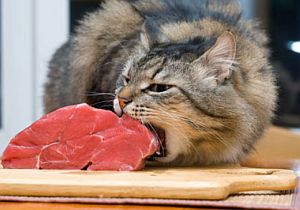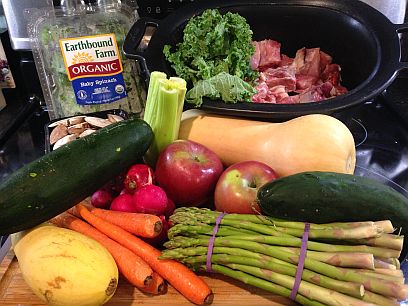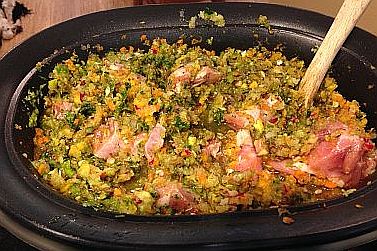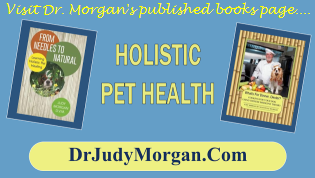Domestic Animals Nutrition and Health
by Dr. Judy Morgan DVM
 When we talk
about cats, they are obligate carnivores, meaning they really need to eat meat to survive. There are
some vegetarian cat foods on the market that are loaded with additives to try to achieve the amino
acid balance necessary for good health. However, they always fall short when compared to feeding
cats what they are supposed to eat: meat. When I started practice back in the mid 80’s, we saw many
cats being diagnosed with hypertrophic cardiomyopathy, retinal degeneration, tooth decay, and digestive disturbances.
When we talk
about cats, they are obligate carnivores, meaning they really need to eat meat to survive. There are
some vegetarian cat foods on the market that are loaded with additives to try to achieve the amino
acid balance necessary for good health. However, they always fall short when compared to feeding
cats what they are supposed to eat: meat. When I started practice back in the mid 80’s, we saw many
cats being diagnosed with hypertrophic cardiomyopathy, retinal degeneration, tooth decay, and digestive disturbances.
After much research, it was discovered that the high carbohydrate, grain based diets being fed to cats
were deficient in an amino acid called taurine. Taurine is essential to maintain good health in cats and they
are incapable of producing taurine on their own. Taurine is found in higher concentrations in fish, eggs, meat, and dairy products.
All of these foods might be part of the natural diet of a cat, but are not found in vegetarian diets. Some of
the more popular cat foods, particularly the dry foods, are corn-based and have very little meat. Because of this,
taurine is added as a “supplement” in the food. As a holistic veterinarian, I have a better solution: feed the pet a
more natural diet that contains real food instead of feeding an unnatural diet supplemented with chemicals and vitamins.
 Not only do I advocate
feeding pet’s real food, I also advocate feeding foods to help heal specific conditions they may have. Just as feeding
a diet with an appropriate amount of taurine can prevent eye, heart, and digestive issues in cats, we can add specific
foods to the diet to heal or prevent any variety of illnesses.
Not only do I advocate
feeding pet’s real food, I also advocate feeding foods to help heal specific conditions they may have. Just as feeding
a diet with an appropriate amount of taurine can prevent eye, heart, and digestive issues in cats, we can add specific
foods to the diet to heal or prevent any variety of illnesses.
Everything we eat affects the body in multiple ways. Foods can help warm or cool the body. Things like curry and lamb
add heat to the body and cause sweating to occur.
Pets do not sweat, so they will pant and drink more water to cool themselves when fed foods that are energetically
hot. Some diseases produce a lot of heat in the body; inflammatory diseases like arthritis, diabetes, and infection will produce heat.
Feeding diets that contain a lot of warming, or “Yang”, foods would be contra-indicated for those conditions. Other
foods will help cool the body, like cold melons in the summer. Pets can eat melons and they make a great snack on a
hot summer day. Most meats tend to be more “Yang” or warm in energy, but cold water fish and rabbit tend to be cooler,
or more “Yin”. So pets with inflammatory conditions would be better served by feeding these “cooler” proteins.
In addition to warming or cooling the body, foods can be used to add energy as “Qi” tonics. Qi is the energy of life
and old or weak pets would be well served by being fed foods that will add energy. Some common Qi tonics include
meats like beef, chicken, rabbit, lamb, and tripe, and vegetables like pumpkin, squash, sweet potato, and Shiitake mushrooms.
 Food can also be used to decrease
phlegm production, which is commonly seen with sinus infections and other diseases, like dry eye, where mucous is formed.
Clams, radishes, kelp, pears, and apples are great for decreasing mucous. Foods to avoid would include any dairy products,
as milk is really just a natural form of mucous.
Food can also be used to decrease
phlegm production, which is commonly seen with sinus infections and other diseases, like dry eye, where mucous is formed.
Clams, radishes, kelp, pears, and apples are great for decreasing mucous. Foods to avoid would include any dairy products,
as milk is really just a natural form of mucous.
Tumors, lumps, and bumps can be made to dissolve or decrease in
size by feeding foods that resolve stagnation. The easiest way to illustrate stagnation is to think of a bruise. A bruise is
an area where blood has pooled or become stagnant. It has a lavender color and is painful.
Tumors are just another form of stagnation, where blood and energy have gotten “stuck”.
To help move the blood and decrease stagnation we can feed foods like lamb, venison, crab, shrimp, radishes, ginger, turmeric,
and vinegar. Turmeric has become all the rage recently and you’ll be able to find a ton of articles touting its cancer-curing capabilities.
There are also many articles spouting the benefits of vinegar.
These are just a few examples of using food for healing. Working with a
holistic veterinarian who specializes in food therapy can be
very helpful in determining which foods might benefit your pet. Sometimes foods can be added to your pet’s current diet. Other times
your veterinarian will be able to work with you to come up with a specific recipe for a homemade diet for your pet.
My advice to everyone is to learn to read labels, know what is really in the food you are feeding your pet. Ignore advertising, as most of
it is false. Watch for pet food recalls and avoid companies that have a lot of recalls.
 For more information on home cooking for your
pet, check out my website: www.drjudymorgan.com. You’ll also find links to my published
books, including a cookbook for dogs using Chinese Medicine theory.
For more information on home cooking for your
pet, check out my website: www.drjudymorgan.com. You’ll also find links to my published
books, including a cookbook for dogs using Chinese Medicine theory.
Dr. Judy Morgan is a nationally renowned veterinarian certified in acupuncture, food therapy, and chiropractic care for dogs,
cats, and horses. A sought-after speaker and blogger at both the local and national level, she integrates Eastern and Western
medicine in her two award-winning practices in New Jersey.